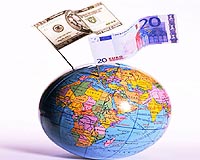| . |  |
. |
Beijing (AFP) May 11, 2010 China said Tuesday that consumer prices and bank lending accelerated in April, fuelling fears the economy may overheat and building pressure on Beijing to hike interest rates and let its currency rise. Property prices also marked a double-digit rise for the third straight month, signalling measures introduced by the government in recent weeks to curb inflation and rein in soaring prices were having little effect. "Currently, prices are rising quite fast," a spokesman for the National Bureau of Statistics, Sheng Laiyun, told reporters, though he insisted those increases remained "relatively mild". "In the near term, prices are still under quite significant upward pressure. Total demand is still on the rise and domestic liquidity is still abundant." The consumer price index, the main gauge of inflation, rose a higher-than-expected 2.8 percent compared with April last year, outpacing the 2.4 percent jump in March, the NBS reported. Analysts had expected an increase of 2.7 percent, according to Dow Jones Newswires. Sheng emphasised it was still possible for Beijing to achieve its own inflation target of three percent for the year, but analysts expressed concern that the rises were too fast. The figures sent stocks tumbling to near one-year lows. "China is at risk of overheating, with spot fires breaking out in various parts of the economy, most notably the property market and bank lending," said Brian Jackson, a senior analyst at Royal Bank of Canada in Hong Kong. Jackson said higher interest rates and a moderate appreciation in the currency would help Beijing keep inflationary pressures from reaching "damaging levels". New loans issued by Chinese banks hit 774 billion yuan (113 billion dollars) in April after falling to 510.7 billion yuan in March while property prices rose 12.8 percent year-on-year last month, official data showed. Instead of raising interest rates to calm inflation, the central bank has increased banks' reserve requirements three times this year, which effectively limits the amount of money they can lend. Policymakers have also introduced a series of measures in recent weeks to rein in property prices. Among them are a tightening of restrictions nationwide on advance sales of new property developments, the introduction of new curbs on loans for third home purchases and the raising of minimum down-payments for second homes. The Shanghai Composite index closed down 1.9 percent at 2,647.57, with property shares among the biggest losers. Sheng warned that while China's economic recovery was now on a more solid footing, high unemployment in the United States and Europe's debt crisis would impact the country's exports this year. Weaker demand for Chinese-made goods could prompt Beijing to delay a move on the value of the yuan, which has been effectively pegged at 6.8 to the dollar since mid-2008 to support exporters during the financial crisis. The Asian nation rebounded to a trade surplus of 1.68 billion dollars in April, but that figure was down 87 percent from the previous year, official figures released Monday showed. Despite the pick-up in inflation, economists believe the central bank will wait until the middle of the year before raising interest rates. "The rate hike seems to have been delayed to give room for the market to absorb the recently announced property tightening measures," said UBS economist Wang Tao. "We expect... three hikes in benchmark interest rates starting mid-year." However, a top government economist said at the weekend that the scope for a rise was small because economic growth likely peaked in the first quarter and rates in the United States and other countries remained relatively low. A Chinese rate hike could encourage speculative funds to flow into the country to take advantage of the relatively higher yield, said Ba Shusong of the cabinet's Development Research Centre, according to media reports. Urban fixed asset investment, a measure of government spending on infrastructure and a key driver of China's economy, rose 26.1 percent in the January-April period to 4.67 trillion yuan, the NBS said. Industrial output from the country's millions of factories and workshops rose 17.8 percent year-on-year in April, while retail sales were up 18.5 percent to 1.15 trillion yuan.
Share This Article With Planet Earth
Related Links The Economy
 EU leaders draft $1 trillion rescue plan
EU leaders draft $1 trillion rescue planBrussels (UPI) May 10, 2010 European leaders Monday agreed on a massive rescue package of nearly $1 trillion to battle the debt crisis threatening Europe's financial and economic stability. At the end of an extraordinary 10-hour meeting, finance ministers from the European Union Monday agreed to provide $560 billion in new loans and $76 billion under an existing lending program to those eurozone countries that nee ... read more |
|
| The content herein, unless otherwise known to be public domain, are Copyright 1995-2010 - SpaceDaily. AFP and UPI Wire Stories are copyright Agence France-Presse and United Press International. ESA Portal Reports are copyright European Space Agency. All NASA sourced material is public domain. Additional copyrights may apply in whole or part to other bona fide parties. Advertising does not imply endorsement,agreement or approval of any opinions, statements or information provided by SpaceDaily on any Web page published or hosted by SpaceDaily. Privacy Statement |